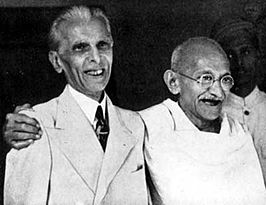CONTRADICTIONS IN MOHAMMAD ALI JINNAH
M.A. Jinnah is perhaps the most abused man in India. Nationalists hate him. He is considered responsible for dividing India. He started his career as nationalist and ended up as a most vocal critic of the concept of India. How this ambassador of Hindu-Muslim unity turned rogue? This question still eludes a convincing answer.
Jinnah’s life can be divided broadly into two parts. In the initial part of his life, he was the loyal member of Congress party. According to the Pakistani historians he believed in the constitutional methods to achieve political goals. He disagreed with Gandhi’s methods of mass mobilization and protests.
Muslim historians, including Ayesha Jalal who glorifies ideas and achievements of Jinnah, prefer to highlight the non-religious lifestyle of Jinnah. He is also projected as a secular man who has nothing to do with the ideology of Islam as such.
It helps Muslim historians to draw an inference that secular man became the most vocal advocate of forming a state on the basis of religion, not because of his commitment to the religion, but simply because he was convinced that Muslims of the subcontinent could not get a fair deal in India after the departure of British rulers.
Jinnah believed that Hindus and Muslims can never live together in peace. At least that was his publicly stated position after leaving Congress. According to him, Hindus and Muslims belong to the two separate civilizations. He highlighted to put forth his view that Hindus and Muslims do not inter-marry. They do not inter-dine. Their history is different. The hero of one community is the enemy of the other.
Interestingly he also wrote in one of his articles that parliamentary form of democracy is fit for a homogeneous society like Britain, it is not suited for a heterogeneous society like India. Somehow he concluded that it is not possible for Hindus and Muslims to consider religion as a matter of individual faith. He observed Islam and Hinduism have meshed to such an extent in the life of individuals that they cannot get rid of it. In the elections, they will surely vote along religious and caste lines.
If this is the case then multiculturalism can be considered as a failed concept. Then most of the European nations should also be divided along religious lines. Western countries should throw Muslims and Hindus out as they are unfit to live in a secular nation.
Jinnah was the man of contradictions. On certain occasions, he displays his penchant for British values and methods. Other occasions he appears as Muslim supremacist. In his first presidential address in the constituent assembly of Pakistan in 1946 Jinnah said, ‘In course of time Hindus would cease to be Hindus, and Muslims would cease to be Muslims, not in the religious sense, because that is the personal faith of each individual, but in the political sense as citizens of the State.’
If this was the logic he believed in then what was the need for dividing India.
As a very shrewd lawyer, Jinnah sensed that Muslims can be mobilized on religious lines. He gave the call of Islam in danger. He was not fond of peaceful means. He gave a call to Muslims to indulge in rioting. Muslim league declared direct action on 16 August, 1946. It led to the rioting 5000 people were killed in Calcutta alone.
Jinnah married a Parsi girl. He was 39 and she was 18 at the time of their marriage. First, he converted her into Islam and then married her. When his daughter Dina wanted to marry a Parsi, Jinnah did not allow her. Still, she went ahead with the marriage, but Jinnah ex-communicated her.
Jinnah married a Parsi girl. He was 39 and she was 18 at the time of their marriage. First, he converted her into Islam and then married her. When his daughter Dina wanted to marry a Parsi, Jinnah did not allow her. Still, she went ahead with the marriage, but Jinnah ex-communicated her.
For most Indians, he is a villain. But he can be a hero for those who believe that homogeneity is the basis of creation of state and Muslims cannot live in a secular state as a minority, as their life should only be guided by their religious dogmas. There are many in Hindu right who hate Nehru and like the idea of two nation theory. They blame Nehru for losing the opportunity of surgical division on religious lines by allowing Muslims to stay in India after the proposal for partition was accepted.
Reference
- http://www.columbia.edu/itc/mealac/pritchett/00islamlinks/txt_jinnah_assembly_1947.html
- http://themmindset.wordpress.com/2010/11/15/direct-action-day-16-august-1946/
- Makers of Modern India, Ramchandra Guha
- https://www.youtube.com/watch?v=lydFzrLmMCg




Comments
Post a Comment